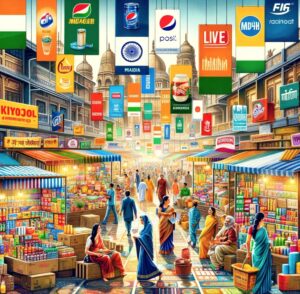Introduction
The Indian consumer goods market is home to a variety of dominant players in the FMCG space, each vying for consumer attention with a portfolio of popular brands. Among these are Procter & Gamble (P&G), Marico, Britannia Industries, and Colgate-Palmolive India, all of which cater to various product segments, from personal care to food and health products. This comparison takes a detailed look at their business models, market positioning, financial health, competitive advantages, and growth prospects.
1. Procter & Gamble (P&G) India
Business Model
P&G India is a subsidiary of the global consumer goods company Procter & Gamble, which is one of the largest FMCG companies worldwide. P&G India operates across several key categories, including personal care, home care, health, and hygiene. It is best known for brands such as Ariel, Tide, Pampers, Gillette, and Oral-B. P&G’s business in India focuses on premium products, brand loyalty, and innovation.
Key Strengths
- Global Brand Recognition: As part of the P&G portfolio, the company has strong brand equity in various segments, particularly in home care and personal hygiene.
- Innovation & Premium Products: P&G frequently innovates its products, introducing premium and more effective solutions to its consumers.
- Strong Distribution Network: With P&G’s well-established distribution infrastructure, the company is able to reach even the most remote areas of India.
Key Weaknesses
- Price Sensitivity: The premium nature of P&G’s products makes them less price-sensitive, which can be a challenge in a price-conscious market like India.
- Competition from Local Brands: P&G faces stiff competition from homegrown brands in India, especially in categories like shampoos, soaps, and detergents.
Financials (FY 2023-24)
- Revenue: ₹13,000 crores (approx.)
- Profit After Tax (PAT): ₹2,500 crores
- EBITDA Margin: 23.2%
- Market Capitalization: P&G’s India division operates as part of the global company, which has a market cap of approx. ₹5.5 Trillion (global figure).
2. Marico Limited
Business Model
Marico is a leading consumer goods company that focuses on personal care and wellness products. It has a strong portfolio of brands in the beauty and wellness segments, including Parachute, Saffola, Nihar, and Livon. Marico is also a major player in the edible oils and health foods sector, which has seen significant growth over recent years.
Key Strengths
- Strong Brand Portfolio: Marico’s brands like Parachute and Saffola dominate the market in hair oils and edible oils, respectively.
- Health & Wellness Focus: With rising health-consciousness among Indian consumers, Marico has capitalized on the growing demand for health foods, cooking oils, and wellness products.
- Aggressive Marketing: Marico’s aggressive marketing strategies, especially in rural markets, have helped it achieve strong brand recognition and loyalty.
Key Weaknesses
- Exposure to Raw Material Prices: Marico’s edible oils business is subject to volatility in raw material prices, which can impact margins.
- Intense Competition: Marico faces significant competition in both its core sectors (hair oils, edible oils) from large multinational and local brands.
Financials (FY 2023-24)
- Revenue: ₹14,000 crores (approx.)
- Profit After Tax (PAT): ₹1,950 crores
- EBITDA Margin: 20.5%
- Market Capitalization: ₹1.2 Trillion (approx.)
3. Britannia Industries
Business Model
Britannia Industries is one of India’s leading food companies, with a dominant presence in the bakery, dairy, and snack sectors. It is most famous for its biscuits (Britannia Marie, Good Day, and Treat) but has also expanded into dairy products (like Britannia cheese and milk), cakes, and snacks. The company has consistently grown by capitalizing on the increasing demand for packaged foods.
Key Strengths
- Market Leadership in Biscuits: Britannia is the undisputed leader in the Indian biscuit market, with a wide variety of products that appeal to both mass and premium consumers.
- Strong Distribution Network: Britannia’s robust distribution network ensures that its products reach even remote corners of India.
- Brand Recognition: The brand is well-established and trusted by Indian households, especially for daily use in food items like biscuits and dairy.
Key Weaknesses
- Dependence on Biscuits: Despite its diversification into dairy and snacks, Britannia still heavily depends on its biscuits segment for revenue.
- Rising Input Costs: Increases in raw material costs (such as wheat and sugar) can impact profitability, especially in the mass-market product categories.
Financials (FY 2023-24)
- Revenue: ₹17,000 crores (approx.)
- Profit After Tax (PAT): ₹2,500 crores
- EBITDA Margin: 19.7%
- Market Capitalization: ₹1.2 Trillion (approx.)
4. Colgate-Palmolive India
Business Model
Colgate-Palmolive India, part of the global Colgate-Palmolive group, is best known for its oral care products, including the flagship Colgate toothpaste. In addition to oral care, the company operates in the personal care and home care segments. Colgate-Palmolive has a strong market position in the toothpaste category and is now expanding into other consumer products, including skin care and home care.
Key Strengths
- Oral Care Leadership: Colgate is the dominant player in India’s oral care market, with a strong brand presence in toothpaste and toothbrush segments.
- Brand Loyalty: The Colgate brand has a very strong presence, benefiting from high levels of consumer trust and loyalty.
- Expanding Product Portfolio: Colgate-Palmolive has been expanding its portfolio into personal care and home care products, further strengthening its market position.
Key Weaknesses
- Limited Product Range: While Colgate has strong dominance in oral care, it faces challenges in expanding rapidly in other personal care and home care segments compared to competitors like P&G.
- Dependency on Toothpaste Sales: The company’s heavy reliance on toothpaste and related products could limit its growth prospects in more diverse FMCG segments.
Financials (FY 2023-24)
- Revenue: ₹6,500 crores (approx.)
- Profit After Tax (PAT): ₹1,100 crores
- EBITDA Margin: 25.1% (strong margins in oral care)
- Market Capitalization: ₹72,000 crores (approx.)
Comparative Analysis
| Parameter |
P&G India |
Marico |
Britannia Industries |
Colgate-Palmolive India |
| Market Segments |
Personal Care, Home Care, Hygiene |
Personal Care, Edible Oils, Wellness |
Food, Bakery, Dairy, Snacks |
Oral Care, Personal Care, Home Care |
| Key Brands |
Ariel, Tide, Pampers, Gillette, Oral-B |
Parachute, Saffola, Livon, Nihar |
Britannia Marie, Good Day, Treat, Britannia Dairy |
Colgate, Palmolive, Protex |
| Strengths |
Strong Global Brand, Innovation |
Health & Wellness Focus, Rural Reach |
Market Leader in Biscuits, Strong Distribution |
Oral Care Leadership, High Margins |
| Weaknesses |
Price Sensitivity, Competition |
Raw Material Volatility, Intense Competition |
Dependence on Biscuits, Rising Input Costs |
Limited Product Range, Dependence on Toothpaste |
| Revenue (FY 2023-24) |
₹13,000 crores |
₹14,000 crores |
₹17,000 crores |
₹6,500 crores |
| Profit (PAT) |
₹2,500 crores |
₹1,950 crores |
₹2,500 crores |
₹1,100 crores |
| EBITDA Margin |
23.2% |
20.5% |
19.7% |
25.1% |
| Market Cap (2024) |
₹5.5 Trillion (Global) |
₹1.2 Trillion |
₹1.2 Trillion |
₹72,000 crores |
Conclusion
Each company holds a unique position in India’s consumer goods market, with specific strengths and challenges. Procter & Gamble India leverages its global brand strength and innovation, although it faces pricing challenges in the Indian market. Marico is a leader in wellness and personal care, but also faces raw material price volatility. Britannia Industries enjoys strong leadership in the biscuit segment, though its over-reliance on biscuits poses a risk. Finally, Colgate-Palmolive India continues to dominate the oral care market but needs to diversify further to compete across a broader range of FMCG categories.



